
The men's 100 metres sprint event at the 1928 Summer Olympics in Amsterdam, Netherlands, were held at the Olympic Stadium on Sunday, 29 July and Monday, 30 July. Eighty-one runners entered, though ultimately seventy-six runners from 32 nations competed. NOCs were limited to 4 competitors each. The event was won by Percy Williams of Canada, taking the nation's first men's 100 metres gold medal. Jack London of Great Britain took silver, marking the third consecutive Games that Great Britain had a medalist in the event. Georg Lammers won bronze, Germany's first medal in the event since 1896. For the first time in modern Olympic history, the United States won no medals in the event.

The men's 200 metres was the second-shortest of the men's track races in the Athletics at the 1964 Summer Olympics program in Tokyo. 63 athletes from 48 nations entered, with 6 not starting in the first round. The maximum number of athletes per nation had been set at 3 since the 1930 Olympic Congress. The first two rounds were held on 16 October, with the semifinals and the final on 17 October. The event was won by 0.2 seconds by Henry Carr of the United States, the nation's 11th victory in the event. Fellow American Paul Drayton took silver; it was the fifth time in six Games that the United States had the top two finishers. Edwin Roberts gave Trinidad and Tobago its first medal in the men's 200 metres with his bronze.

The men's 400 metres hurdles was the longer of the men's hurdle races in the Athletics at the 1964 Summer Olympics program in Tokyo. It was held on 14 October, 15 October, and 16 October 1964. 39 athletes from 26 nations competed, with 1 more not starting in the first round. The maximum number of athletes per nation had been set at 3 since the 1930 Olympic Congress. The first round was held on 14 October, with the semifinals on 15 October and the final on 16 October. The event was won by Rex Cawley of the United States, the nation's sixth consecutive and 11th overall victory in the men's 400 metres hurdles. For the first time since 1952, the Americans did not sweep the event. John Cooper earned Great Britain's first medal in the event since 1928 with his silver; Salvatore Morale took Italy's first-ever medal in the 400 metres hurdles with his bronze.
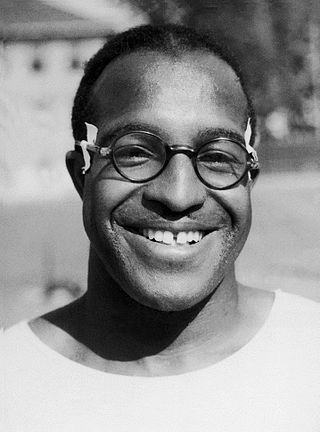
The men's 200 metres sprint event at the 1932 Summer Olympics took place on August 2 and August 3 at the Los Angeles Memorial Coliseum. There were 25 athletes from 13 nations. The 1930 Olympic Congress in Berlin had reduced the limit from 4 athletes per NOC to 3 athletes. After missing the podium entirely in 1928, the United States swept the medals in the event in 1932. It was the second medal sweep in the event by the United States, as well as the nation's sixth victory in eight Games. Eddie Tolan won gold by 0.2 seconds, with George Simpson winning silver and Ralph Metcalfe winning bronze.
The men's 400 metres was an event at the 1928 Summer Olympics in Amsterdam. Fifty athletes from 20 nations competed. NOCs were limited to 4 competitors each. The event was won by Ray Barbuti of the United States, the first title for the Americans in the event since 1912 and the fifth overall. Jimmy Ball won Canada's first medal in the event, a silver.

The men's 200 metres was an event at the 1992 Summer Olympics in Barcelona, Spain. There were 79 participating athletes from 65 nations, with eleven qualifying heats. The maximum number of athletes per nation had been set at 3 since the 1930 Olympic Congress. The event was won by 0.12 seconds by Michael Marsh of the United States, the nation's third consecutive and 15th overall victory in the event. The Americans would take a second medal for the third consecutive Games as well, this time with Michael Bates earning bronze. The silver medal went to Frankie Fredericks, taking Namibia's first medal in the men's 200 metres.

The men's 200 metres event was part of the track and field athletics programme at the 1924 Summer Olympics. The first two rounds were held on 8 July, with the semifinals and final on 9 July. Sixty-five sprinters from 33 countries competed. Nations were limited to 4 athletes each. The event was won by 0.1 seconds by Jackson Scholz of the United States, the nation's third consecutive victory in the event and fifth in six Games. For the third straight Games, the podium consisted of two Americans winning gold and silver and a Briton taking bronze. Paddock, the silver medalist in 1920 as well, was the second man to earn multiple medals in the 200 metres.
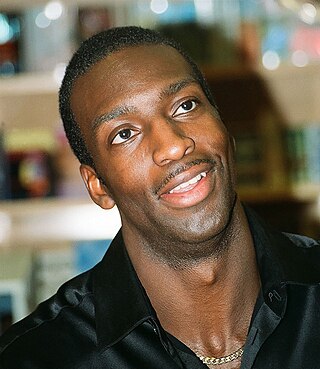
The men's 200 metres was an event at the 1996 Summer Olympics in Atlanta, Georgia. There were 78 participating athletes from 57 nations, with eleven qualifying heats (78), five quarterfinal races (40), two semifinals (16) and a final (8). The maximum number of athletes per nation had been set at 3 since the 1930 Olympic Congress. The event was won by Michael Johnson of the United States, the nation's fourth consecutive and 16th overall victory in the event. Frankie Fredericks of Namibia won his second straight silver medal, the eighth man to win multiple medals in the 200 metres. Ato Boldon earned Trinidad and Tobago's first medal in the event with his bronze.

The men's 200 metres was held on 2 September and 3 September as part of the athletics at the 1960 Summer Olympics, which were held in Rome. 74 athletes from 54 nations entered, but only 62 athletes from 47 nations ultimately competed. The maximum number of athletes per nation had been set at 3 since the 1930 Olympic Congress. The event was won by 0.1 seconds by Livio Berruti of Italy, the first victory in the event by a nation outside of North America and snapping a five-Games winning streak by the United States. The Americans finished with a silver medal, by Lester Carney, to extend their medal streak to six Games. Abdoulaye Seye of France took bronze. Berruti's gold and Seye's bronze were the first medal for their nations in the men's 200 metres.
The men's 100 metres sprint event at the 1976 Olympic Games in Montreal, Quebec, Canada, was held at Olympic Stadium on July 23 and 24. Sixty-three athletes from 40 nations competed. Each nation was limited to 3 athletes per rules in force since the 1930 Olympic Congress. The event was won by 0.02 seconds by Hasely Crawford of Trinidad and Tobago, earning the nation's first gold medal and making Crawford a national hero. Don Quarrie's silver medal made Jamaica only the third country to reach the men's 100 metres podium three consecutive times. Valeriy Borzov of the Soviet Union was unable to defend his title, but by taking bronze became the third man to medal twice in the event. For only the second time, the United States did not have a medalist in the event.

The men's 200 metres was an event at the 1976 Summer Olympics in Montreal. The competition was held on 25 July 1976 and 26 July 1976. There were 45 competitors from 33 nations. The maximum number of athletes per nation had been set at 3 since the 1930 Olympic Congress. The event was won by 0.06 seconds by Don Quarrie of Jamaica.

The men's 200 metres sprint event at the 1936 Olympic Games took place between August 4 and August 5. There were 44 athletes from 22 nations competing. The maximum number of athletes per nation had been set at 3 since the 1930 Olympic Congress. The final was won by 0.4 seconds by American Jesse Owens, with silver going to Mack Robinson. Owens thus reached 3 gold medals in 1936, with the sprint relay still to come. The Netherlands earned its first medal in the men's 200 metres with Tinus Osendarp's bronze.
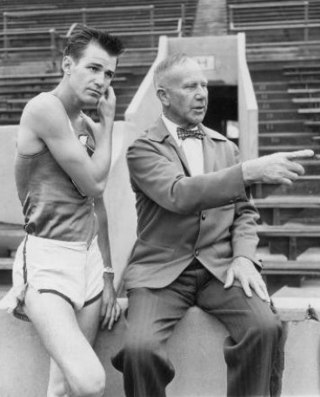
The men's 200 metres sprint event at the 1948 Summer Olympics took place between 2 August and 3 August. There were 51 competitors from 28 nations. The maximum number of athletes per nation had been set at 3 since the 1930 Olympic Congress. The final was won by American Mel Patton. His countryman Barney Ewell earned silver, making this the third consecutive Games the United States took the top two spots in the event. Lloyd La Beach's bronze gave Panama a medal in its debut in the event.

The men's 400 metres sprint event at the 1948 Olympic Games took place between August 4 and August 5. Fifty-three athletes from 28 nations competed. The maximum number of athletes per nation had been set at 3 since the 1930 Olympic Congress. The final was won by 0.2 seconds by Jamaican Arthur Wint coming from almost 10 meters back to catch teammate and world record holder Herb McKenley. This was Jamaica's first Olympic gold medal in their debut participation at the Games, and broke a string of 3 straight American victories in the men's 400 metres.

The men's 400 metres hurdles event at the 1932 Olympic Games took place on July 31 and August 1 at the Los Angeles Memorial Coliseum. There were 18 competitors from 13 nations. The 1930 Olympic Congress in Berlin had reduced the limit from 4 athletes per NOC to 3 athletes. The event was won by Bob Tisdall of Ireland, the nation's first medal in the event in its 400 metres hurdles debut. The United States took silver and bronze, extending its streak of taking at least silver in all 7 appearances of the event to that point. Taylor became the first man to earn three medals in the event, adding to his 1924 gold and 1928 bronze. Defending champion David Burghley of Great Britain finished fourth.
The men's 100 metres sprint event at the 1952 Olympic Games in Helsinki, Finland was held at the Olympic Stadium on 20 and 21 July. Seventy-two athletes from 33 nations competed; each nation was limited to 3 runners. The final was won by American Lindy Remigino, the fourth consecutive victory by a different American. Herb McKenley won Jamaica's first medal in the men's 100 metres with his silver, while McDonald Bailey's bronze put Great Britain on the podium for the first time since 1928. The final was "probably the closest mass finish in Olympic 100 metre history" with the first four runners all clocking in at 10.4 seconds hand-timed, all six finalists within 0.12 seconds electric-timed, and a photo finish necessary to separate the winners.
The men's 100 metres sprint event at the 1984 Olympic Games took place between August 3 and August 4. Eighty-two athletes from 59 countries participated. Each nation was limited to 3 athletes per rules in force since the 1930 Olympic Congress. The event was won by Carl Lewis of the United States, that nation's first title after two Games of missing the podium. Canada's Ben Johnson took bronze to break up the Americans' bid to sweep the podium ; it was Canada's first medal in the event since 1964.
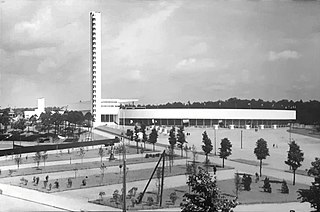
The men's 200 metres sprint event at the 1952 Olympic Games took place between July 22 and July 23. There were 71 competitors from 35 nations. The maximum number of athletes per nation had been set at 3 since the 1930 Olympic Congress. The final was won by 0.16 seconds by American Andy Stanfield. Americans also took silver and bronze as the United States swept the medals in the event for the third time.
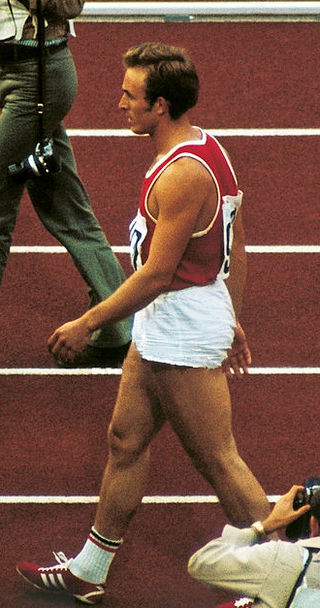
The men's 200 metres was an event at the 1972 Summer Olympics in Munich. The competition was held on 3–4 September. There were 57 competitors from 42 nations. The maximum number of athletes per nation had been set at 3 since the 1930 Olympic Congress. The event was won by 0.19 seconds by Valeriy Borzov of the Soviet Union, the nation's first medal in the event. Larry Black took silver, extending the United States' podium streak in the men's 200 metres to nine Games. Italy earned its first medal in the event since 1960 with Pietro Mennea's bronze.
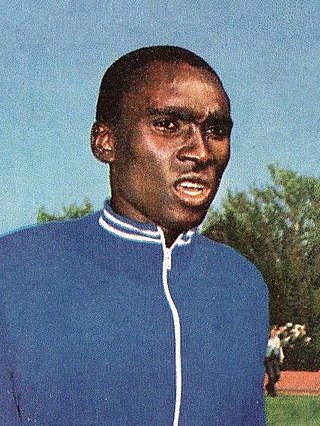
The men's 400 metres hurdles was an event at the 1972 Summer Olympics in Munich. The competition was held on 31 August - 2 September. There were 37 competitors from 25 nations. The maximum number of athletes per nation had been set at 3 since the 1930 Olympic Congress. The event was won by John Akii-Bua of Uganda, the nation's first medal in the event and first gold medal in any Olympic event. Ralph Mann returned the United States to the podium after a one-Games absence with his silver medal, while David Hemery added a bronze to his 1968 gold to become the fifth man to earn multiple medals in the event while extending Great Britain's podium streak in the 400 metres hurdles to three Games.















